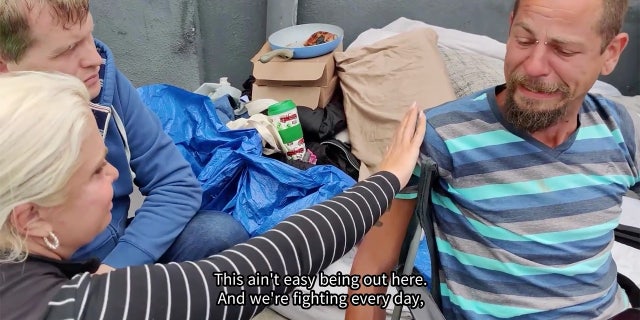Kate Monroe dodged used hypodermic needles, discarded food containers and human waste as she navigated an area of San Diego known by locals as the Bottoms. The Marine Corps veteran and business owner was there to talk to as many of the city’s homeless residents as possible, including one woman who said San Diego makes living on the streets “not that hard.”
“Usually we’re low income and when you’re low income, you get free phones, free food, free clothing, there’s so many resources that are just give and give and give,” Mary said in a video Monroe shared.
“I think we’re spoiled to be honest with you,” Mary added. “My sister’s like, ‘Where do I sign up?’”
‘DOESN’T LOOK LIKE IT’S IN AMERICA’: CEO WEIGHS IN ON SAN DIEGO HOMELESS CRISIS:
WATCH MORE FOX NEWS DIGITAL ORIGINALS HERE
Monroe is the CEO of VetComm, a San Diego business with a nonprofit arm that helps homeless veterans obtain disability compensation and transition into housing. She said she went to speak with those living on the streets of San Diego and nearby Oceanside in May in order to gain a better understanding of the city’s homeless crisis.
“I have witnessed what I think is some of the worst homelessness in the country,” Monroe told Fox News, adding that she has observed the deterioration firsthand since moving to San Diego 20 years ago.
The construction of Petco Park, where the San Diego Padres played their first game in 2004, marked a turning point for the city, Monroe said. As downtown became gentrified, the once-scattered homeless population was eventually pushed into a smaller section of town known by locals as the Bottoms, she said.
Longtime Portland-area outreach worker Kevin Dahlgren joined Monroe on her expedition. Dahlgren posts videos of his conversations with homeless people on Twitter, hoping to shed light on what he calls the West Coast’s “dysfunctional system” for addressing homelessness.
“I was shocked how bad it is there,” Dahlgren said. “A lot of these counties are simply hiding the problem and convincing people that it’s really not that bad. And it’s usually cities that rely heavily on tourism.”
“San Diego’s not on the news nationally, so we don’t get any exposure for our homeless problem,” Monroe said, adding that local leaders get away with “just sweeping it under the rug.”
“The violence is over the top and the homeless camps just go on and on and on,” Dahlgren said.

Kevin Dahlgren and Kate Monroe comfort a homeless man who says he feels ignored by local politicians. (Courtesy Kate Monroe)
The city council this week is considering a ban on erecting tents anywhere in the city provided there is room at homeless shelters. Camping would be banned near schools, homeless shelters, transit stations, waterways or in parks regardless of shelter capacity. Meanwhile, the San Diego Housing Commission plans to buy four hotels to house more than 400 homeless individuals.
“We found a whole street of people that they literally have 15 signs up that say ‘No drugs on this block.’ They all go and try to get jobs every day,” she said. “One whole street is full of people that you could get off the street today.”
Then the focus could turn to people with mental health issues and, lastly, those suffering from severe drug addiction whom she says are a bad fit for the “housing first” approach.
“It’s like a feeding frenzy,” Monroe said of the Bottoms. “When we were down there, people are doing drugs in the middle of the day, live right in front of police.”
San Diego “is a very rich city,” Monroe said. “There’s absolutely no reason why we can’t figure this out.”
To hear more from Monroe, click here.


